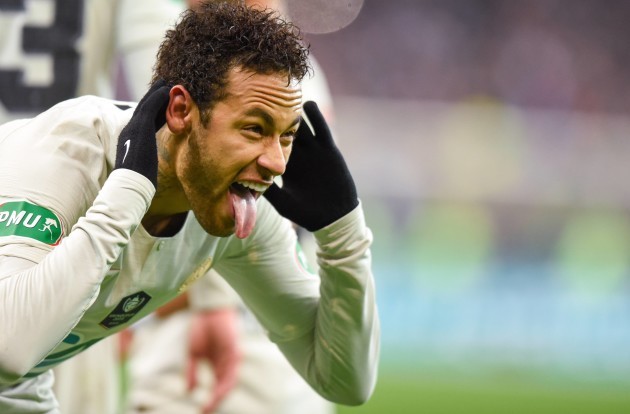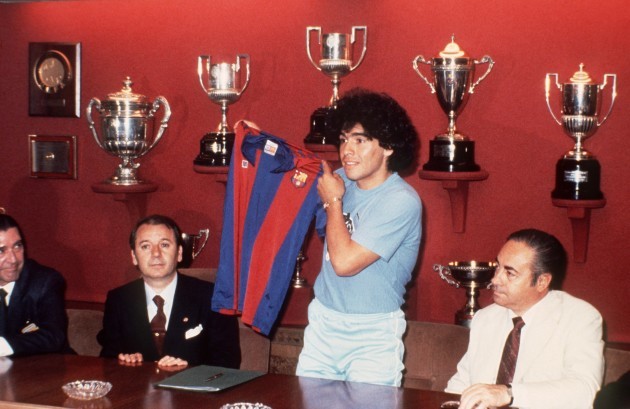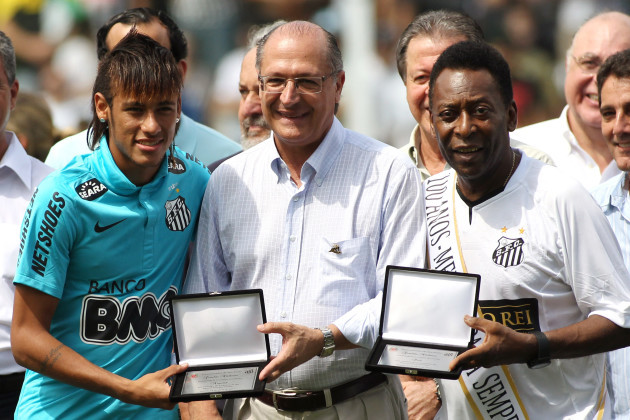IT SEEMS THE condition of some of the best South American talents in Barcelona’s history – some are forced to grow up too fast, while others don’t grow up at all.
Diego Maradona was providing for his family from his early teens, and when he was 20, Argentina’s authoritative football magazine El Grafico were leveraging his football talent to reflect an Argentina under military dictatorship in better light.
For a tour of Britain and Ireland in 1980, they gave Maradona a diary to write, and they published extracts in which he writes of his fear of being brutalised by opponents along with a separate Sunday Times pean to his ball control.
The intensity of the public gaze on Maradona intensified to an absurd degree when he left Barcelona for Naples – on his arrival, a local newspaper said that although the city didn’t have “”a mayor, houses, schools, buses, employment and sanitation, none of this matters because we have Maradona” – and within a couple of years, he was pleading with the president to be sold, amid the grip of a cocaine addiction that brought him close to the Camorra.
He was eventually banned by Fifa in 1990, and fled back home. He was then arrested in Buenos Aires for drug use in 1991, poignantly found alone in bed in his underwear, curled up in the foetal position.
“He lost his youth”, lamented international teammate Sergio Batista. “He didn’t have a youth.”
Ronaldinho, by contrast, seemed to live an eternal youth.
His partying proclivities followed him around Europe, although he did briefly settle at Barcelona, where he won the European Cup and became only the second Barcelona player ever – Maradona was the first – to be applauded from the Bernabeu by Real Madrid fans.
After the 2006 World Cup, however, his interest waned. He gained weight and was shipped out by Pep Guardiola, who fretted he was leading Leo Messi astray.
Messi – taken from Argentina at the age of 13 and embedded within the Barcelona youth system – assumed Ronaldinho’s shirt number and exceeded his status.
Ronaldinho, meanwhile, made a half-hearted effort at AC Milan and then trotted around the globe, briefly catching form back home with Atletico Mineiro before it evaporated and he moved to Mexico, finishing up in 2015 in relative obscurity with Fluminense.
As it turned out, Ronaldinho could pass just about anything but a party.
The great football South American football writer Tim Vickery has considered why Ronaldinho – which translates as ‘Little Ronaldo’ - couldn’t grow up, and came to the role his brother Assis in his career.
Ronaldinho’s father died in a swimming pool accident when he was eight, so Assis became his agent and manager, referred to by Ronaldinho as “my idol.”
“A son should eventually outgrow and replace his father”, writes Vickery. “What appears to have happened with Ronaldinho is that the younger brother may always be the junior partner.”
Maradona and Ronaldinho didn’t get a return to Barcelona – but another of their errant South American stars just might.
Speculation says Neymar, having walked out of the Camp Nou for the promise of wealth and personal awards in Paris two years ago, is set for a return to Barcelona this summer.
He has told PSG he wants out, Messi – and thus, by extension, Barca – wants him back and the PSG president has hinted he would be open to a sale with his not-particularly-veiled-at-all “no more celebrity behaviour will be tolerated here” comments.
Should Neymar go back to Spain, it offers him the chance to rescue a career gone that has gone awry.
Like Maradona, Neymar was hailed as a golden child in South America but in contrast, he wasn’t forced to forage through Europe alone and instead ended up like Ronaldinho, infantalised beneath the shade of a family member.
Neymar has thus added some unwanted significance to the ‘Junior’ on the back of his shirt, and its presence implies the existence of a Neymar Senior.
Together, they are best understood as Neymar Ltd.
It’s impossible not to talk about Neymar’s career without reference to his father, which is far greater than the absurdly-remunerated agent/advisor role he currently plays.
In 2013, Neymar and his father co-wrote a book called Neymar: Conversations with My Father.
In spite of its vaguely august title, don’t feel a need to rush out and buy the book – it is terrible.
It reads like another bit of fluff clinging to the stage-managing of Neymar’s career and celebrity; focus-grouped to cause minimal impact and filled with bland sentiments between father and son.
“His love and support have been central to all my achievements”, writes Neymar of his Dad; “My precious jewel” replies Senior with a bit of prescience.
Alternating chapters are told by the respective Neymars, although sentences like “one of my great pleasures is to ride my bike along Santos’ shore” cast serious doubt as to whether Junior actually wrote his part of the book.
Still, the book gives an insight into the influence his father has had over Neymar and of how he grew up in an environment in which he was never forced to mature.
Neymar Snr was a footballer himself, but he never fulfilled his own potential having contracted TB.
He wasn’t prepared to allow his son’s talent be thwarted – or unrewarded, at least – so he learned to become a PE teacher to better coach his son, showing him video clips from a very early age of how best to improve.
With a host of Brazilian clubs clamouring for Junior’s signing before he was even a teenager, Santos was eventually chosen, with Senior immediately showing his talent for negotiations.
To get the deal over the line, Santos had to found an U13 team in which Neymar could play, and give the coach Betinho a fuel allowance so he could drive Neymar to and from training.
Soon, Senior was interrupting sessions telling Betinho he was coaching Junior wrong.
Within years, Santos’ pragmatic accessions had warped into ludicrous indulgences.
In a Brazilian League game against Atletico Goianense, Santos were leading 3-2 when they were awarded a penalty. Neymar had missed his last three spot-kicks, but nonetheless wanted to take it. The manager, Dorival, demanded otherwise, beseeching another player, Marcel to take it.
Neymar’s palpable on-field strop escalated into a dressing room argument with the captain, and Dorival proposed a 15-day ban as punishment that would have meant missing an upcoming derby game with Corinthians.
Remarkably, the Santos directors were so keen to make Neymar available for that game that they sacked Dorival. Neymar played, scored a penalty, and Santos lost 3-2. There’s a parable for childish indulgence in there somewhere.
At Barcelona his petulance and selfishness were tempered, given he had to subjugate himself to a team structure in which Lionel Messi was the undisputed star.
Now that he is the subject of relentless international mockery, it is easy to lose sight of just how good he was at Barcelona – he, not Messi, was the chief architect of the extraordinary 6-1 defeat of PSG at the Nou Camp, in one of the best individual performances in the recent history of the Champions League.
At PSG, however, that immaturity has reared its head again.
His father is understood to have been central to Neymar’s moving to Paris, and he made almost €11 million in commission for sealing the deal.
While it is easy to scorn Neymar for his time in Paris - interrupted by injury, dogged by off-field distraction and besmirched by diminishing effort – it is a terrible environment for him.
While Neymar has proved to be a particularly immature player, would any but the most slavishly temperate not at least occasionally lose their minds at a club awarding players an “ethical bonus” enticing players to simply applaud their own fans?
A return to Barcelona offers Neymar a chance to redeem himself according to a football irony – being part of a coherent team structure offers the individual a chance to stand on their own two feet.
Which is something he has been struggling with over the last two years.



